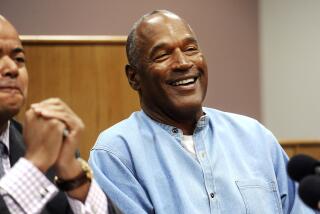The O.J.-Kramer discrepancy
- Share via
WELL, THAT was a close one.
After pulling back from the brink via the midterm elections, Americans seem to be in the mood for more accountability. On Monday, media magnate Rupert Murdoch announced that he was dropping “If I Did It,” the coyly titled, thoroughly tasteless television-and-book project starring O.J. Simpson and masterminded by News Corp. that was set to debut next week.
The project caused a reignition of the outrage about the Simpson verdict that’s been simmering for the last decade and fueled rebellion not only among the public but among Murdoch’s own ranks, including Bill O’Reilly. Even O.J. neutralists like me -- to this day, I’m not sure whether he did it -- had to concede that the former football star belongs in some ethical netherworld occupied by other tragically deluded celebrities such as Phil Spector and Michael Jackson.
Of course, the O.J. indignation is driven in large part by racial indignation: the idea that a black man may have killed a white woman and gotten away with it. That’s a violation of decorum and social law that white America cannot tolerate, whatever the findings of a court -- and that fact sealed O.J.’s fate long before the announcement and subsequent disappearance of “If I Did It.”
For the record, a black man -- albeit a rich and famous black man -- prevailing against the odds and against history in the criminal justice system didn’t make me feel smug or triumphal as an African American. It only made me feel surprised. I do feel, however, that the decision was a rare instance of equal treatment, if not justice.
Unlike justice, equal treatment is often a morally neutral idea that applies not only to worthy things like jobs and education, but to crime and punishment as well. O.J. at least forced us all to consider that. Though in the current debacle more of us can agree that O.J. got what he deserved.
A much less satisfying story concerns Michael Richards and his explosion on stage last week at the Laugh Factory in West Hollywood. Richards, known for years as the lovable eccentric Kramer on “Seinfeld,” had either a breakdown or a prolonged moment of truth during a stand-up performance when he began talking back to some black patrons during his act.
Richards repeatedly called them “nigger,” and his insults didn’t stop at the word. Richards told the hecklers that “50 years ago, we’d have you upside down” and sodomized with a fork.
To me, he sounded less like a stand-up comic grasping at ways to save his act than a man imbued with white privilege, enraged that some black folks had dared to criticize him. People started leaving, either because they were insulted or because they feared a riot.
And let’s face it, a white man screaming an epithet like “nigger” in a crowded club is akin to anybody screaming “fire” in a crowded theater. Of course, you can get arrested for the latter, not the former. But in so egregiously violating social law, even for a comic on a bad night, Richards should have to atone in a more meaningful way than confessing his sin to David Letterman, a savvy public relations move that means he’s almost out of the woods already.
Sounding uncannily like Richard Nixon in 1973, Richards declared, “I am not a racist.” This may make liberal Hollywood in particular and white people in general feel better. But how about facing the black people he so viciously maligned? And how about probing the possibility that he may be racist -- why should we take him at his word?
I’m not equating racist invective with charges of double homicide. But the reality is that there is far more tolerance for a white person’s unseemly behavior than for similar behavior of somebody who isn’t white, especially if the unseemliness involves race. Richards’ “racist rant” has been described as a terrible but isolated incident. O.J., meanwhile, is condemned for his character.
Richards, like O.J., is a celebrity who achieved cult-hero status. Like O.J., he projects and reflects his followers’ deepest held beliefs about things they don’t even know they believe until -- in a split second -- something brings it to the surface and forces a crisis.
O.J. was and is a crisis on every level, including a public relations crisis. Richards, meanwhile, is so far simply a public relations challenge. This says more about equality -- and the rules of decorum -- than we like to imagine.
More to Read
The complete guide to home viewing
Get Screen Gab for everything about the TV shows and streaming movies everyone’s talking about.
You may occasionally receive promotional content from the Los Angeles Times.






